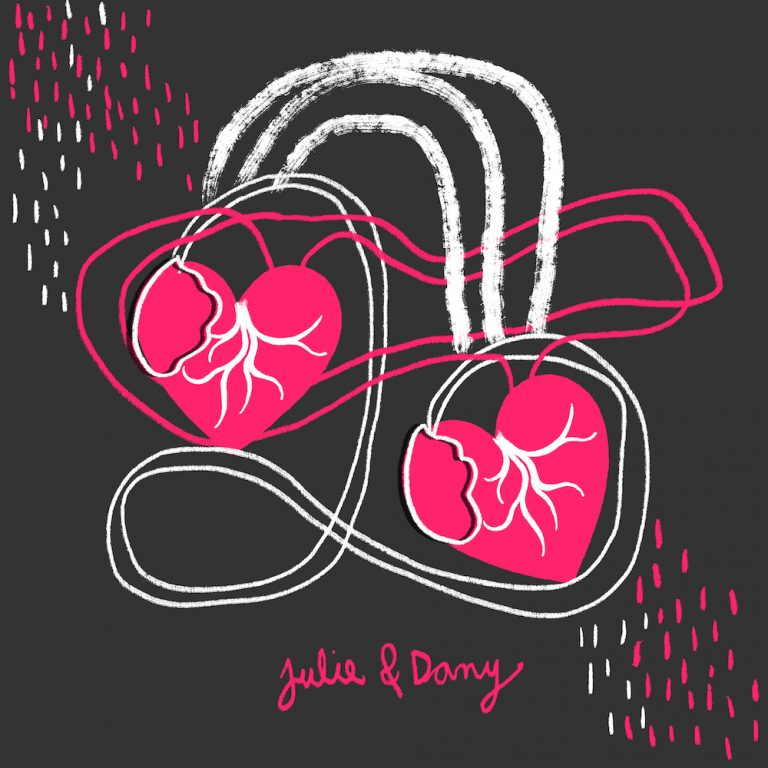Having both made musical contributions to each other’s latest albums, Julie & Dany marks the first full-length collaboration between Julie Doiron and Dany Placard. Even if the two weren’t already a couple, it’s a musical partnership that wouldn’t surprise anyone – both are Canadian musicians who have spent the last 25 years making minimalist folk music centred around nature, friendship, love and longing.
Created entirely during lockdown, Julie & Dany exudes a minimalist homespun charm in both its lyrics and sound. While not as bracing as Fiona Apple’s Fetch The Bolt Cutters or Taylor Swift’s Folklore – both albums that have been rightfully lauded for their musical significance during lockdown – Julie & Dany feels like one of the most honest and empathetic musical explorations of pandemic life.
Like much of the couple’s solo music, the tales chronicled across Julie & Dany are intimate and broadly relatable. The narrative arcs on the two’s first collaborative LP are small but meaningful, documenting Doiron and Placard as they find solace in nature, connect with each other and navigate the mental and romantic strains of lockdown. At their core, these are songs about how we carry those we love through the hardest times in their lives and how they do the same for us.
On “Lying”, Placard asks “are you lying / lying to me?” with an acute sense of fragility and defeatism in his voice that recalls Daniel Johnston, before Doiron joins to ask “Are you trying to leave?” The wearied back and forth between the two reflects a relationship of immense love trying to overcome the strains of fatigue, concern and 24/7 exposure to each other. “What If I Said”, meanwhile, sees an increasingly pessimistic Doiron questioning her past and her future (“What If I said I had nothing left to give?”) before her spiralling is interrupted by a firm, but supportive partner (“Come on Julie, just get out of bed”).
On paper, and in practice, there are numerous similarities between the music of Doiron and Placard, yet both’s solo discographies are unquestionably distinct from each other, and it can be occasionally jarring to listen to the two try to combine their divergent styles. The aforementioned “What If I Said”, for instance, begins as a traditional Doiron song, led by understated acoustic guitar strumming, before the electric guitar crashes in – seemingly out of nowhere – on the song’s second half.
More often than not, however, the couple’s pairing proves fruitful. “Tomate” sees the two bring the best out of each other as Placard’s guitar playing takes the song in a darker, more melodic direction without overpowering Doiron’s contribution.
Conversely, just as the two know when to push each other in new, exciting directions, they also know when to let the other take the lead. “Back To The Water” recalls Doiron’s best, mid-2000s output (notably Woke Myself Up) as she finds comfort in nature and reaches quiet revelation (“I don’t need to know the answers / I don’t need to be alone / And I’m not afraid to be”). “Jean-Talon Market” operates on the same plane, zooming in on small intimacies to recall the giddy highs of a blossoming relationship (“Maybe we could get a coffee / Maybe we could walk around the market”).
Meanwhile, “Mayo” feels unmistakably like Placard’s own. Heavy, tongue-in-cheek and more tightly coiled than anything else here, it also makes for the album’s most bizarre lyrical moments, which recall Silver Jews’ American Water (“Y’a presque plus de Cheez Whiz / Dans l’fridge”). The song feels as though it was written in a stream of consciousness, with an inventory of food in the cupboards and fridge interrupted by moments of deep despair (“J’ai l’espoir qui s’epuise”). Like with the best songs on Julie & Dany, listening to it feels like being a fly-on-the-wall; laying witness to two creative spirits crafting music in real time while simultaneously guiding each other through the most challenging time in living memory.

